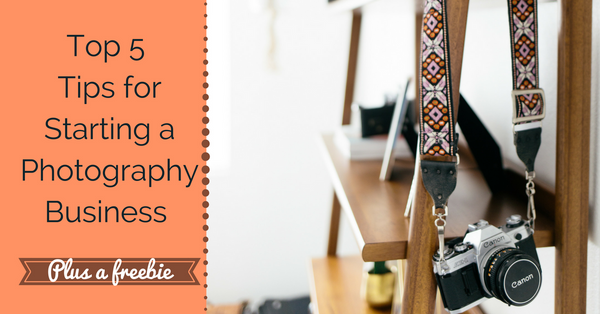Your Cart is Empty

There are a number of great reasons to turn your passion for photography into a profitable business, including getting paid to do what you love, meeting new people, traveling, having a flexible schedule and helping others capture special moments in their lives. Another reason is to earn extra income and have a photography business on the side. That's how I started my photography business.
Starting a photography business can be a rewarding and fulfilling career path for those with a passion for capturing beautiful images. Whether you’re an amateur photographer looking to turn your hobby into a full-time job or a professional photographer seeking to expand your business, there are a few key steps you can take to get your business off the ground.
If you love photography, and want to know all about how to start a photography business, check out these tips below.
One of the first things you’ll want to do when starting a photography business is to define your niche. Do you want to focus on wedding photography, portrait photography, or commercial photography? Each niche requires a different skill set and may appeal to different types of clients, so it’s important to have a clear focus.
When starting a photography business, one of the first things you need to do is set up a website.
A photography website can be a great way to showcase your work and attract new clients. There are many different platforms that you can use to create a website, such as WordPress, Wix, or Squarespace, and there are also many templates available that will allow you to get started quickly. Your site should feature some of your best work, as well as information about who you are and what services you offer.
You will also want to include a blog with your website. Yes, that's right, you need a website "AND" a blog. Not only does blogging help you establish yourself as an industry expert and stand out from your competitors, it's also a great way to get visitors to your website for FREE. And when you're starting a photography business chances are you aren't going to have a lot of money for paid advertising.
You might be thinking, "but I'm a photographer, not a writer." If you struggle to write photography blog content each week, you'll want to invest in the pre written blog posts for photographers subscription. It will save you so much time and you'll be able to focus on the photography side of your business. in which you share tips about what to wear or how you work or post sessions.
As a photographer, your equipment is an essential part of your business. While you don’t need the most expensive gear to get started, it’s important to invest in high-quality equipment that will produce professional-looking results. This may include a DSLR or mirrorless camera, lenses, lighting equipment, and other accessories.
Creating a photography business brand is important for gaining exposure and recognition in the industry. A strong brand will make your business more memorable and help you stand out from the competition. There are many ways to create a powerful photography brand, such as developing a unique style, using consistent branding elements, and creating photography welcome guide packets that highlight your work.
When people see your work, you want them to know that it was you behind the lens. While creating your own photographic style can help, creating a brand will really bring your business full circle. This includes your logo, website, blog, and social media profiles.
Make sure that they have the same look and feel – including consistency in fonts, colors, and overall style. By taking the time to create an effective branding strategy, you can build a successful photography business that stands out from the rest.

There are a few key things to consider when naming your photography business. You want something that is creative, memorable and representative of what you do. You also need to make sure the name is legally available for use. When choosing a name, it's important to be as specific as possible about the type of photography you offer. This will help potential clients know right away what kind of services you provide.
Now that you have a business name and have decided on a structure, you will need to apply for a photography business license or permit.
The application process varies by municipality, so be sure to check with your city or county clerk's office for specific instructions. Typically, you'll need to provide information about yourself and your business, as well as pay a fee. Also keep in mind that you will need a license before you can open your business bank account.
Most photographers are sole proprietors because it’s simple and low cost. If you set up a sole proprietorship you would need to file a Schedule C with your annual tax return. It's best to hire an enrolled agent to do your taxes each year since they will be able to guide you and find you in the best ways to get the most deductions. They may also have knowledge of deductions you could be missing out on. If you don't go the sole proprietorship route, and you want to protect your personal assets in the event of a lawsuit, a limited liability company (LLC) is a better choice.

Do you already have a professional camera? What about the right lenses for the type of photography you are offering? These can be pricey.
There are a few initial costs to consider when starting a photography business. Costs may include the price of equipment, software, subscriptions, and other tools necessary for success.
Along with your camera, you will probably need some additional supplies, including flashes, extra batteries, studio lights, backdrops, and photo editing software. Don't forget the photography welcome guide templates that will save you time and help you up-level your brand.
You'll also need to factor in marketing and advertising expenses, as well as your business license and insurance fees. Generally speaking, the more startup capital you have at your disposal, the better equipped you'll be to launch your new venture.
If you’re turning your hobby into a business, you may already have some equipment.
As a photographer, your portfolio is your calling card. It’s a way for potential clients to see your work and get a sense of your style and expertise. Even if you’re just starting out, it’s important to start building your portfolio as soon as possible. You can do this by shooting for friends and family, volunteering your services for local events, or taking on paid gigs whenever you can.
Make sure you have a photography business plan. Then you will be able to put prices on photography services appropriately.
There is no one formula for creating a photography business plan. However, there are some key components that all businesses should include in order to have a solid foundation on which to grow and succeed. Your plan should outline your mission statement, target market, marketing strategy, financial goals and projections, as well as how you will measure success. It's also important to be realistic about the amount of time and money you can commit to your business in the early stages; most businesses require considerable effort and investment before they become profitable. By taking the time to create a detailed photography business plan, you're laying out a roadmap for yourself and ensuring that your photography venture has the best possible chance of succeeding
Remember, you won’t make any money if you give free sessions to family and friends, which a lot of new photographers do in the beginning. A lot of photographers start out by offering photography mini sessions.

Once you’ve got your business up and running, it’s important to get the word out and attract clients. You can do this through a variety of marketing techniques, such as networking with other professionals in your field, building relationships with local businesses and organizations, and using social media to showcase your work and reach a wider audience.
There are many challenges that come with starting a photography business. One of the main challenges is figuring out how to get your work seen by potential clients. You need to find effective ways to market your photography, which can be difficult without prior experience or knowledge in marketing.
Another challenge is pricing your services appropriately. Photographers often face competition from lower-priced amateur photographers, so it's important to set rates that reflect the quality of your work and still make you a profit.
Finally, time management can be tricky for photographers who juggle multiple clients at once; learning how to manage your time effectively will help ensure that all deadlines are met without sacrificing quality
It’s certainly not easy to start a new business, regardless of the industry you’re in.
Here are a few other challenges you might encounter when starting a photography business:
Starting a photography business can be challenging, but with the right combination of passion, skill, and determination, it can also be incredibly rewarding. By following these steps, you’ll be well on your way to building a successful and sustainable photography business.
If you feel that starting a photography business is definitely something you’d like to pursue, make sure you check out these photography marketing tips.
And here's an additional resource if you want to learn how to start a photography business:
How to Start a Photography Business E-Guide

I am very thankful for your blog; Your pretty right before putting business know first what is needed and plus a little knowledge for the business so, when the day goes you are ready for everything. Congrats!
I loved your ideas! It was super helpful and easy to understand. We are lucky to have people like you, who are sharing their knowledge with others.
Regards from Mexico.
I would also make a note to do book keeping on all expenses made for photography for tax related purpose and getting a business license.
Comments will be approved before showing up.
Lewis Shikapwasha
May 02, 2018
Thank you so much for the knowledge.